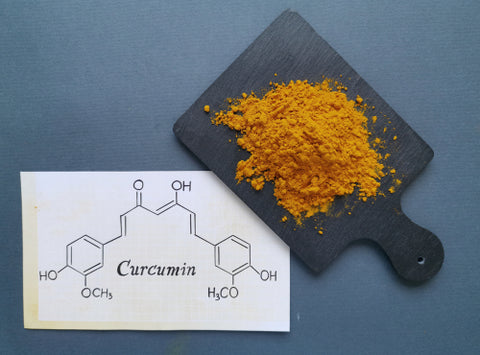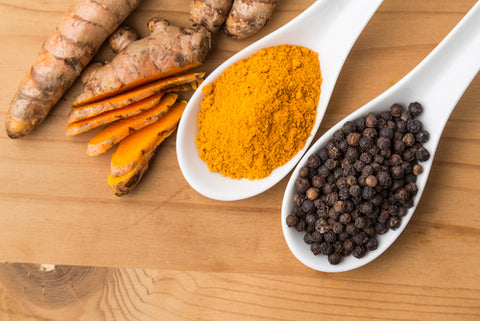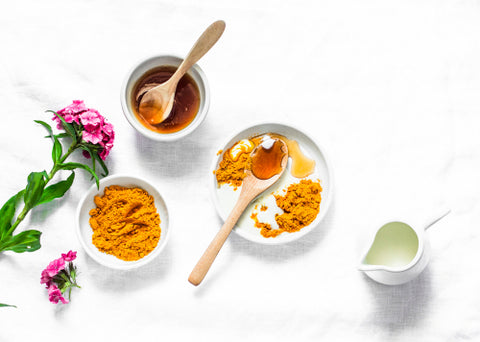What is turmeric?
Turmeric, a rhizome (root) from the plant Curcuma longa, is known for being ground into a bright-yellow spice that is widely popular in India, Asia, and the Middle East. It has been used for centuries in cuisine and traditional Ayurvedic medicine. Early healers once used turmeric as a medicine that was taken in the form of powders, potions, and juice, or applied topically as an ointment, cream, or oil.
Today, turmeric is promoted as a dietary supplement that can be taken for various conditions, from arthritis to depression. There have been dozens of reputable studies around the major health benefits of turmeric for the body, and many of these benefits are due to curcumin. (32)
What is curcumin?
Curcumin is one of the natural phytochemicals found in turmeric and is by far the most chemically active ingredient.
Curcumin not only gives turmeric root powder its vibrant orange-yellow pigment, but it is also behind the spice's anti-inflammatory and antioxidant properties that benefit our overall health in a variety of ways. (15)
The reason for its popularity— and the magic behind turmeric— lies in its active compound curcumin.
Curcumin has been utilized in Ayurvedic medicine for over 3000 years. Historically used a panacea for a wide variety of ailments, only recently has clinical research confirmed what traditional Indian medicine has known for countless generations—turmeric is chocked full of health benefits.
Recently, the Arthritis Foundation identified curcumin as a major anti-inflammatory force and suggested incorporating turmeric into your daily diet. The compound has also been shown to fight against free radicals and bolster the body’s natural antioxidant defenses. It eases joint pain and much like it’s cousin ginger, turmeric has stomach-soothing capabilities, making it ideal for those with colitis, irritable bowel disease and gastric inflammation.
Modern research has also shown that curcumin possesses pain-relieving benefits analogous to Advil and Motrin.
In one study, the compound worked as well as ibuprofen in reducing pain and improved function in people suffering from osteoarthritis. Another study linked orally taking turmeric extract with lower cholesterol levels after only three months. (15)

How to get the most from your turmeric: Easy tips to keep in mind
As with most natural remedies, finding the most effective and safe dosage of turmeric or curcumin can be challenging. One key element to tapping into the benefits of turmeric lies in how you choose to consume or apply it. Before we get to our list of benefits, we've rounded up our six top tips on how to get the most from turmeric.
Take it in powder or supplement form
While one could consume enough turmeric through culinary use, if you are looking to use turmeric for its therapeutic benefits for heart disease, arthritis, or Alzheimer's prevention, it is better to opt for a supplement. Opt for a dietary supplement containing fermented turmeric as well as black pepper. Ask your general practitioner about fermented turmeric supplements. (29)
Combine turmeric with pepper to maximize curcumin absorption
It can be challenging to make the curcumin in turmeric bioavailable, meaning able to be absorbed by the body through digestion so that you can reap the benefits. It helps to consume turmeric or curcumin supplements with black pepper, which contains piperine. Findings show that piperine is a natural chemical that enhances the body's absorption of curcumin by 2,000%. (38)
 Coupling turmeric with black pepper can enhance the spice’s anti-inflammatory and antioxidant properties.
Coupling turmeric with black pepper can enhance the spice’s anti-inflammatory and antioxidant properties.
Choose fermented turmeric
Fermented turmeric roots have more concentrated nutrient levels, providing maximum bioavailability. Therefore, fermented turmeric powder is more concentrated than regular turmeric powder, boosting the flavor, absorption, potency, digestion, and assimilation of phytonutrients such as curcumin. The fermentation process also reduces the carbohydrates and sugar content found in turmeric powder. (31) (21) (18)
Aim to ingest turmeric with fats
When taking a turmeric or curcumin supplement, try to consume it with a meal containing healthy fats, such as chia seeds or nut butter. Curcumin is a fat-soluble compound, meaning it won't dissolve in water and needs fatty compounds to be broken down. Findings have shown that consuming turmeric or curcumin with fats helps increase absorption. (17)
Try making a golden milk turmeric latte
Do you normally have a cup of matcha as part of your daily wellness regime?
You should consider trying to make a golden milk turmeric latte. We have a video with a simple recipe right below!
You can spice up your routine by making a turmeric matcha latte or opting for an iced golden matcha latte, which offers a powerful boost to your overall health and delivers relaxed focus. (22) (1)
Don't overdo supplements
When used in cooking or consumed in tea form, turmeric is very safe. However, the higher doses used in experimental studies can cause issues in some individuals. Findings have shown that 1,500 to 2,000 mg of turmeric a day may increase the risk of kidney stones, liver damage, and slow blood clotting; interfere with iron metabolism; and cause nausea and diarrhea. (33) (25)
Fourteen evidence-based benefits of turmeric
Combat chronic inflammation
When left unaddressed, chronic inflammation can wreak havoc on the body, playing a role in various health conditions and diseases such as cancer, heart disease, and Alzheimer's. Turmeric's main active ingredient — curcumin — can potentially help combat chronic inflammation. Studies have shown that in high doses, curcumin can suppress inflammation by helping fight free radicals and repairing bodily damage caused by oxidation. (15) (12) (14)
Alleviate arthritis
Studies over the past few years have shown that it may help relieve joint pain. In one randomized trial, patients given two 500 mg capsules of curcumin experienced as much pain relief as those who took 50 mg of the anti-inflammatory drug daily. Another study done over 12 weeks found that turmeric extract was more effective than the placebo in reducing knee pain in those with knee osteoarthritis. (37) (43)
Manage and prevent diabetes
Thanks to its antioxidant and anti-inflammatory properties, it may help balance blood sugar in individuals with type 2 diabetes. One clinical trial found that participants who supplemented their diabetes medication with turmeric experienced lower blood sugar levels, inflammation, and oxidative stress. Another randomized controlled trial with over 240 prediabetic people found that those who took a daily supplement of 250 mg of curcumin for nine months did not develop type 2 diabetes, while 16.4% of the placebo group did. (26) (8) (10)
Heighten your body's antioxidant capacity
Oxidative damage is one of the biggest stressors on the body and accelerates aging and many chronic conditions. It is not only an incredible natural antioxidant, but it may also help the body better absorb and use other antioxidants. Both animal and cellular research suggest that curcumin may neutralize free radicals and help stimulate other antioxidants though more human clinical studies are needed to confirm these benefits. (27) (36)
Boost brain health
Several animal studies have found that curcumin can increase brain levels of brain-derived neurotrophic factor (BDNF), a gene that impacts neuron health and longevity. This means that, when taken as a supplement, curcumin may help improve memory and attention. In one 18-month human study wherein half of the participants took 90 mg of curcumin twice a day and the others took a placebo, the participants who took the curcumin twice a day had a 28% improvement in their memory tests. In comparison, the placebo group had no notable memory improvements. (3) (41) (16) (17)
Help treat Alzheimer's disease
Alzheimer's disease is the world's most common form of dementia. Research findings suggest that curcumin may help prevent the formation of and even help break down amyloid-beta plaques — which are toxic protein 'clumps' or 'tangles' that build up in the body from Alzheimer's disease. Current studies are looking at whether curcumin can stop or potentially reverse Alzheimer's disease in humans. (47) (46)
Combat depression
It may be a natural way to alleviate symptoms of depression. In one controlled trial, 60 individuals with major depressive disorder were placed into three groups at random—one group took one gram of curcumin daily, another took the antidepressant medication Prozac and curcumin, and the third group took only Prozac for six weeks. Findings from this study showed that curcumin could be just as effective as the antidepressant Prozac. Furthermore, other findings suggest curcumin can boost the brain's serotonin and dopamine levels. (35) (23) (34)
Protect eyes against degeneration
Did you know a turmeric solution may help reduce the symptoms of developing eye conditions and also protect the eyes from degeneration?
The curcumin found in turmeric has shown promise in detecting and treating neurodegeneration in the eyes. An animal-based study published in Scientific Reports found that when used topically, curcumin may protect eyes against degeneration. In the study, researchers placed a curcumin eye drop solution in the rats' eyes two times per day for three weeks. After three weeks, untreated rats had a 23% reduction in their retina cells compared to the rat group receiving topical curcumin eye drops. (9) (30)
Slow down aging
Curcumin has been well-documented to combat the effects of oxidation and inflammation in the body, and researchers believe it may even have effects that go far beyond disease prevention. Due to the positive health effects seen against heart disease, cancer, Alzheimer's, and other chronic diseases, researchers believe curcumin has the potential to be used as an anti-aging supplement at any age. (40) (39)
Stunt cancer growth and development
Multiple studies have shown that curcumin effectively combats the rampant and dangerous cellular growth that comes with cancer. Researchers have found that curcumin can help reduce the growth of new blood vessels in existing tumors, prevent metastasis (the spread), and may even help the body destroy cancerous cells. In one 30-day study where 44 men with lesions in their colons were given 4 grams of curcumin a day, the participants experienced a 40% reduction in lesions. (2) (36) (13) (6)
Improve skin health
Because it is full of antioxidants and anti-inflammatory compounds such as curcumin, turmeric has the amazing ability to help boost skin health. Curcumin has been linked to helping with a range of dermatological conditions, such as alopecia, psoriasis, acne, and eczema. Findings also show that the curcumin in turmeric can help speed up wound healing. Topical and oral turmeric products have gained popularity for improving skin health; however, more studies need to be conducted to completely understand turmeric's effectiveness in dermatology. (42)

Minimize the risk of heart disease
Curcumin has several beneficial effects that combat various elements of heart disease. Curcumin can help reduce oxidation and inflammation, but the most notable effect that curcumin has against heart disease is its ability to enhance the lining of blood vessels, known as the endothelium. This is what permits curcumin to help regulate blood pressure, blood clotting, and other factors of heart disease. In one study of 121 adults undergoing coronary bypass surgery, participants who received 4 grams of curcumin for a few days before and after surgery had a 65% lower chance of a heart attack in the hospital. (21) (19) (20) (44)
Combat symptoms of common allergies
Do you suffer from hay fever (allergic rhinitis)? Promising studies have shown that consuming turmeric can reduce the symptoms of hay fever, such as itching, runny nose, sneezing, and congestion. Researchers have found that curcumin can alleviate nasal symptoms and improve airflow in patients with allergic rhinitis. In another animal-based study, mice treated with turmeric experienced a significantly reduced allergic response. (24) (45)

Reduce symptoms of IBS
Early findings, including a study of 207 adults and another animal study using rats, found that turmeric can help improve IBS symptoms such as abdominal pain and cramping. Turmeric is also being studied as a potential treatment for other digestive diseases such as Crohn's disease and ulcerative colitis. (5) (28) (11)
Could taking turmeric lead to any side effects?
When taken in acceptable doses, turmeric usually doesn’t cause severe side effects. That being said, too much of a good thing can lead to adverse effects. Some people report experiencing mild symptoms such as an upset stomach, dizziness, and diarrhea when it is taken in higher doses. However, it is likely safe to apply turmeric topically or consume it in a tea form.
Wondering how much turmeric is safe to consume?
According to research, taking turmeric in higher amounts than 1.4 milligrams per pound of bodyweight could have adverse side effects.
Combining matcha and turmeric for a wider range of health benefits with each sip
If you were wondering, turmeric and matcha are the perfect pair! Not only does turmeric add an amazing twist to the already earthy-sweetness of matcha, but both are packed with antioxidants and vitamins. The meditative ritual of preparing matcha compliments the memory and mood-boosting properties already found in curcumin.
And with the all-natural energy found in matcha, pairing it with turmeric is the perfect way to start your day, protect your health and escape those caffeine jitters.
The Bottom Line: Try Turmeric
Turmeric has low bioavailability. This means that the body’s absorption and access to the health compounds in turmeric is often challenging. The good news is that many experts believe that adding this golden spice to tea may be the most effective way to consume turmeric. It’s already a wildly popular custom in India and Japan—whether in grated or pure powder form, turmeric is a perfect addition to your favorite tea blend -- just remember to add a dash of black pepper to boost the bioavailability!
Turmeric is truly a superfood ingredient that can do wonders for your wellness when consumed and used correctly.
Recent research results on turmeric's health benefits are very promising, but keep in mind you could experience side effects from the regular ingestion of turmeric.
If there is a specific health concern you are looking to address with turmeric or curcumin, we recommend having a conversation with your doctor before making it a staple in your daily routine.
References
-
Angelo, L. S., & Kurzrock, R. (2009). Turmeric and Green Tea: A Recipe for the Treatment of B-Chronic Lymphocytic Leukemia: Fig. 1. Clinical Cancer Research, 15(4), 1123–1125. https://doi.org/10.1158/1078-0432.ccr-08-2791
-
Astinfeshan, M., Rasmi, Y., Kheradmand, F., Karimipour, M., Rahbarghazi, R., Aramwit, P., Nasirzadeh, M., Daeihassani, B., Shirpoor, A., Gholinejad, Z., & Saboory, E. (2019). Curcumin inhibits angiogenesis in endothelial cells using downregulation of the PI3K/Akt signaling pathway. Food Bioscience, 29, 86–93. https://doi.org/10.1016/j.fbio.2019.04.005
-
Benzinger, T. L. S., Blazey, T., Jack, C. R., Koeppe, R. A., Su, Y., Xiong, C., Raichle, M. E., Snyder, A. Z., Ances, B. M., Bateman, R. J., Cairns, N. J., Fagan, A. M., Goate, A., Marcus, D. S., Aisen, P. S., Christensen, J. J., Ercole, L., Hornbeck, R. C., Farrar, A. M., . . . Morris, J. C. (2013). Regional variability of imaging biomarkers in autosomal dominant Alzheimer’s disease. Proceedings of the National Academy of Sciences, 110(47), E4502–E4509. https://doi.org/10.1073/pnas.1317918110
-
Brown, D. A., & Hunger, R. M. (1999). Regulation of in vitro Ptr-toxin Production by Pyrenophora tritici-repentis Isolates by Environmental Parameters and Accumulation of Ptr-toxin in Culture over Time. Regulation der in-vitro-Produktion des Ptr-Toxins von Pyrenophora tritici-repentis-Isolaten durch Umweltparameter sowie zeitabhängige Akkumulation des Ptr-Toxins in Kultur. Journal of Phytopathology, 147(1), 25–29. https://doi.org/10.1111/j.1439-0434.1999.tb03803.x
-
Bundy, R., Walker, A. F., Middleton, R. W., & Booth, J. (2004). Turmeric Extract May Improve Irritable Bowel Syndrome Symptomology in Otherwise Healthy Adults: A Pilot Study. The Journal of Alternative and Complementary Medicine, 10(6), 1015–1018. https://doi.org/10.1089/acm.2004.10.1015
-
Carroll, R. E., Benya, R. V., Turgeon, D. K., Vareed, S., Neuman, M., Rodriguez, L., Kakarala, M., Carpenter, P. M., McLaren, C., Meyskens, F. L., & Brenner, D. E. (2011). Phase IIa Clinical Trial of Curcumin for the Prevention of Colorectal Neoplasia. Cancer Prevention Research, 4(3), 354–364. https://doi.org/10.1158/1940-6207.capr-10-0098
-
Choi, G. Y., Kim, H. B., Hwang, E. S., Lee, S., Kim, M. J., Choi, J. Y., Lee, S. O., Kim, S. S., & Park, J. H. (2017). Curcumin Alters Neural Plasticity and Viability of Intact Hippocampal Circuits and Attenuates Behavioral Despair and COX-2 Expression in Chronically Stressed Rats. Mediators of Inflammation, 2017, 1–9. https://doi.org/10.1155/2017/6280925
-
Chuengsamarn, S., Rattanamongkolgul, S., Luechapudiporn, R., Phisalaphong, C., & Jirawatnotai, S. (2012). Curcumin Extract for Prevention of Type 2 Diabetes. Diabetes Care, 35(11), 2121–2127. https://doi.org/10.2337/dc12-0116
-
Davis, B. M., Pahlitzsch, M., Guo, L., Balendra, S., Shah, P., Ravindran, N., Malaguarnera, G., Sisa, C., Shamsher, E., Hamze, H., Noor, A., Sornsute, A., Somavarapu, S., & Cordeiro, M. F. (2018). Topical Curcumin Nanocarriers are Neuroprotective in Eye Disease. Scientific Reports, 8(1). https://doi.org/10.1038/s41598-018-29393-8
-
Donath, M. Y., Ehses, J. A., Maedler, K., Schumann, D. M., Ellingsgaard, H., Eppler, E., & Reinecke, M. (2005). Mechanisms of -Cell Death in Type 2 Diabetes. Diabetes, 54(Supplement 2), S108–S113. https://doi.org/10.2337/diabetes.54.suppl_2.s108
-
Dulbecco, P. (2013). Therapeutic potential of curcumin in digestive diseases. World Journal of Gastroenterology, 19(48), 9256. https://doi.org/10.3748/wjg.v19.i48.9256
-
Edwards, R. L., Luis, P. B., Varuzza, P. V., Joseph, A. I., Presley, S. H., Chaturvedi, R., & Schneider, C. (2017). The anti-inflammatory activity of curcumin is mediated by its oxidative metabolites. Journal of Biological Chemistry, 292(52), 21243–21252. https://doi.org/10.1074/jbc.ra117.000123
-
Giordano, & Tommonaro. (2019). Curcumin and Cancer. Nutrients, 11(10), 2376. https://doi.org/10.3390/nu11102376
-
He, Y., Yue, Y., Zheng, X., Zhang, K., Chen, S., & Du, Z. (2015). Curcumin, Inflammation, and Chronic Diseases: How Are They Linked? Molecules, 20(5), 9183–9213. https://doi.org/10.3390/molecules20059183
-
Hewlings, S., & Kalman, D. (2017). Curcumin: A Review of Its Effects on Human Health. Foods, 6(10), 92. https://doi.org/10.3390/foods6100092
-
Hurley, L. L., Akinfiresoye, L., Nwulia, E., Kamiya, A., Kulkarni, A. A., & Tizabi, Y. (2013). Antidepressant-like effects of curcumin in WKY rat model of depression is associated with an increase in hippocampal BDNF. Behavioural Brain Research, 239, 27–30. https://doi.org/10.1016/j.bbr.2012.10.049
-
Jäger, R., Lowery, R. P., Calvanese, A. V., Joy, J. M., Purpura, M., & Wilson, J. M. (2014). Comparative absorption of curcumin formulations. Nutrition Journal, 13(1). https://doi.org/10.1186/1475-2891-13-11
-
Jeenger, M. K., Shrivastava, S., Yerra, V. G., Naidu, V., Ramakrishna, S., & Kumar, A. (2015). Curcumin: A pleiotropic phytonutrient in diabetic complications. Nutrition, 31(2), 276–282. https://doi.org/10.1016/j.nut.2014.06.015
-
Jiang, S., Han, J., Li, T., Xin, Z., Ma, Z., Di, W., Hu, W., Gong, B., Di, S., Wang, D., & Yang, Y. (2017). Curcumin as a potential protective compound against cardiac diseases. Pharmacological Research, 119, 373–383. https://doi.org/10.1016/j.phrs.2017.03.001
-
Karimian, M. S., Pirro, M., Johnston, T. P., Majeed, M., & Sahebkar, A. (2017). Curcumin and Endothelial Function: Evidence and Mechanisms of Protective Effects. Current Pharmaceutical Design, 23(17). https://doi.org/10.2174/1381612823666170222122822
-
Kim, S. W., Ha, K. C., Choi, E. K., Jung, S. Y., Kim, M. G., Kwon, D. Y., Yang, H. J., Kim, M. J., Kang, H. J., Back, H. I., Kim, S. Y., Park, S. H., Baek, H. Y., Kim, Y. J., Lee, J. Y., & Chae, S. W. (2013). The effectiveness of fermented turmeric powder in subjects with elevated alanine transaminase levels: a randomised controlled study. BMC Complementary and Alternative Medicine, 13(1). https://doi.org/10.1186/1472-6882-13-58
-
Kochman, J., Jakubczyk, K., Antoniewicz, J., Mruk, H., & Janda, K. (2020). Health Benefits and Chemical Composition of Matcha Green Tea: A Review. Molecules, 26(1), 85. https://doi.org/10.3390/molecules26010085
-
Kulkarni, S. K., Bhutani, M. K., & Bishnoi, M. (2008). Antidepressant activity of curcumin: involvement of serotonin and dopamine system. Psychopharmacology, 201(3), 435–442. https://doi.org/10.1007/s00213-008-1300-y
-
Kurup, V. P., & Barrios, C. S. (2008). Immunomodulatory effects of curcumin in allergy. Molecular Nutrition & Food Research, 52(9), 1031–1039. https://doi.org/10.1002/mnfr.200700293
-
Luber, R. P., Rentsch, C., Lontos, S., Pope, J. D., Aung, A. K., Schneider, H. G., Kemp, W., Roberts, S. K., & Majeed, A. (2019). Turmeric Induced Liver Injury: A Report of Two Cases. Case Reports in Hepatology, 2019, 1–4. https://doi.org/10.1155/2019/6741213
-
Maithili Karpaga Selvi, N., Sridhar, M. G., Swaminathan, R. P., & Sripradha, R. (2014). Efficacy of Turmeric as Adjuvant Therapy in Type 2 Diabetic Patients. Indian Journal of Clinical Biochemistry, 30(2), 180–186. https://doi.org/10.1007/s12291-014-0436-2
-
Menon, V. P., & Sudheer, A. R. (2007). ANTIOXIDANT AND ANTI-INFLAMMATORY PROPERTIES OF CURCUMIN. ADVANCES IN EXPERIMENTAL MEDICINE AND BIOLOGY, 105–125. https://doi.org/10.1007/978-0-387-46401-5_3
-
Ng, Q., Soh, A., Loke, W., Venkatanarayanan, N., Lim, D., & Yeo, W. S. (2018). A Meta-Analysis of the Clinical Use of Curcumin for Irritable Bowel Syndrome (IBS). Journal of Clinical Medicine, 7(10), 298. https://doi.org/10.3390/jcm7100298
-
Patrick, K., & Stanbrook, M. B. (2018). Take turmeric with a grain of salt. Canadian Medical Association Journal, 190(43), E1270. https://doi.org/10.1503/cmaj.181358
-
Pescosolido, N., Giannotti, R., Plateroti, A., Pascarella, A., & Nebbioso, M. (2013). Curcumin: Therapeutical Potential in Ophthalmology. Planta Medica, 80(04), 249–254. https://doi.org/10.1055/s-0033-1351074
-
Pianpumepong, P., Anal, A. K., Doungchawee, G., & Noomhorm, A. (2012). Study on enhanced absorption of phenolic compounds of Lactobacillus-fermented turmeric (Curcuma longaLinn.) beverages in rats. International Journal of Food Science & Technology, 47(11), 2380–2387. https://doi.org/10.1111/j.1365-2621.2012.03113.x
-
Prasad S, Aggarwal BB. Turmeric, the Golden Spice: From Traditional Medicine to Modern Medicine. In: Benzie IFF, Wachtel-Galor S, editors. Herbal Medicine: Biomolecular and Clinical Aspects. 2nd edition. Boca Raton (FL): CRC Press/Taylor & Francis; 2011. Chapter 13. Available from: https://www.ncbi.nlm.nih.gov/books/NBK92752/
-
Qiu, P., Man, S., Li, J., Liu, J., Zhang, L., Yu, P., & Gao, W. (2016). Overdose Intake of Curcumin Initiates the Unbalanced State of Bodies. Journal of Agricultural and Food Chemistry, 64(13), 2765–2771. https://doi.org/10.1021/acs.jafc.6b00053
-
Ramaholimihaso, T., Bouazzaoui, F., & Kaladjian, A. (2020). Curcumin in Depression: Potential Mechanisms of Action and Current Evidence—A Narrative Review. Frontiers in Psychiatry, 11. https://doi.org/10.3389/fpsyt.2020.572533
-
Sanmukhani, J., Satodia, V., Trivedi, J., Patel, T., Tiwari, D., Panchal, B., Goel, A., & Tripathi, C. B. (2013). Efficacy and Safety of Curcumin in Major Depressive Disorder: A Randomized Controlled Trial. Phytotherapy Research, 28(4), 579–585. https://doi.org/10.1002/ptr.5025
-
Sharifi-Rad, J., Rayess, Y. E., Rizk, A. A., Sadaka, C., Zgheib, R., Zam, W., Sestito, S., Rapposelli, S., Neffe-Skocińska, K., Zielińska, D., Salehi, B., Setzer, W. N., Dosoky, N. S., Taheri, Y., el Beyrouthy, M., Martorell, M., Ostrander, E. A., Suleria, H. A. R., Cho, W. C., . . . Martins, N. (2020). Turmeric and Its Major Compound Curcumin on Health: Bioactive Effects and Safety Profiles for Food, Pharmaceutical, Biotechnological and Medicinal Applications. Frontiers in Pharmacology, 11. https://doi.org/10.3389/fphar.2020.01021
-
Shep, D., Khanwelkar, C., Gade, P., & Karad, S. (2019). Safety and efficacy of curcumin versus diclofenac in knee osteoarthritis: a randomized open-label parallel-arm study. Trials, 20(1). https://doi.org/10.1186/s13063-019-3327-2
-
Shoba, G., Joy, D., Joseph, T., Majeed, M., Rajendran, R., & Srinivas, P. (1998). Influence of Piperine on the Pharmacokinetics of Curcumin in Animals and Human Volunteers. Planta Medica, 64(04), 353–356. https://doi.org/10.1055/s-2006-957450
-
Sikora, E., Bielak-Zmijewska, A., Mosieniak, G., & Piwocka, K. (2010). The Promise of Slow Down Ageing May Come from Curcumin. Current Pharmaceutical Design, 16(7), 884–892. https://doi.org/10.2174/138161210790883507
-
Sikora, E., Scapagnini, G., & Barbagallo, M. (2010). Curcumin, inflammation, ageing and age-related diseases. Immunity & Ageing, 7(1). https://doi.org/10.1186/1742-4933-7-1
-
Small, G. W., Siddarth, P., Li, Z., Miller, K. J., Ercoli, L., Emerson, N. D., Martinez, J., Wong, K. P., Liu, J., Merrill, D. A., Chen, S. T., Henning, S. M., Satyamurthy, N., Huang, S. C., Heber, D., & Barrio, J. R. (2018). Memory and Brain Amyloid and Tau Effects of a Bioavailable Form of Curcumin in Non-Demented Adults: A Double-Blind, Placebo-Controlled 18-Month Trial. The American Journal of Geriatric Psychiatry, 26(3), 266–277. https://doi.org/10.1016/j.jagp.2017.10.010
-
Thangapazham, R. L., Sharma, A., & Maheshwari, R. K. (2019). BENEFICIAL ROLE OF CURCUMIN IN SKIN DISEASES. ADVANCES IN EXPERIMENTAL MEDICINE AND BIOLOGY, 343–357. https://doi.org/10.1007/978-0-387-46401-5_15
-
Wang, Z., Jones, G., Winzenberg, T., Cai, G., Laslett, L. L., Aitken, D., Hopper, I., Singh, A., Jones, R., Fripp, J., Ding, C., & Antony, B. (2020). Effectiveness of Curcuma longa Extract for the Treatment of Symptoms and Effusion–Synovitis of Knee Osteoarthritis. Annals of Internal Medicine, 173(11), 861–869. https://doi.org/10.7326/m20-0990
-
Wongcharoen, W., Jai-aue, S., Phrommintikul, A., Nawarawong, W., Woragidpoonpol, S., Tepsuwan, T., Sukonthasarn, A., Apaijai, N., & Chattipakorn, N. (2012). Effects of Curcuminoids on Frequency of Acute Myocardial Infarction After Coronary Artery Bypass Grafting. The American Journal of Cardiology, 110(1), 40–44. https://doi.org/10.1016/j.amjcard.2012.02.043
-
Wu, S., & Xiao, D. (2016). Effect of curcumin on nasal symptoms and airflow in patients with perennial allergic rhinitis. Annals of Allergy, Asthma & Immunology, 117(6), 697–702.e1. https://doi.org/10.1016/j.anai.2016.09.427
-
Zhang, K., Chen, M., Du, Z. Y., Zheng, X., Li, D. L., & Zhou, R. P. (2018). Use of curcumin in diagnosis, prevention, and treatment of Alzheimer’s disease. Neural Regeneration Research, 13(4), 742. https://doi.org/10.4103/1673-5374.230303
-
Zhang, L., Fiala, M., Cashman, J., Sayre, J., Espinosa, A., Mahanian, M., Zaghi, J., Badmaev, V., Graves, M. C., Bernard, G., & Rosenthal, M. (2006). Curcuminoids enhance amyloid-β uptake by macrophages of Alzheimer’s disease patients. Journal of Alzheimer’s Disease, 10(1), 1–7. https://doi.org/10.3233/jad-2006-10101





